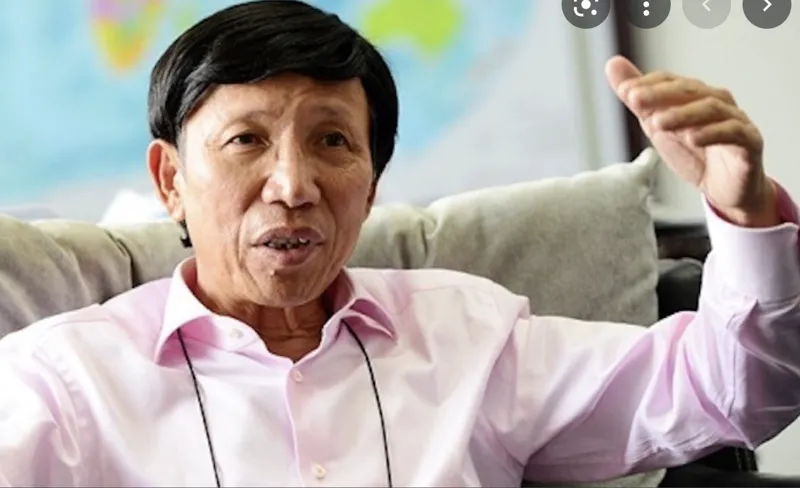
JOURNALIST: - Sir, over the years we have noticed that Vietnam's investments abroad are quite brief, lack in-depth analysis and are evaluated poorly. What is the reason for this?
Dr. PHAN HỮU THẮNG: - Since the issuance of the Government decree 22/1999/ND-CP on overseas investment of Vietnamese enterprises on 14 September 1999, it has been now 24 years. During this time, Vietnam's outside investment has been an incomplete picture. The available data on projects, investment capital, various fields, and countries concerned, is insufficient with a lack of specific assessment on revenue, financial status, budget collection and payment, as well as the causes of success or failure. This lack of data makes it difficult for specialized investment research agencies to comprehensively evaluate Vietnam's current situation regarding outside investment.
- Sir, as the one who has witnessed the issuance of Vietnam's first overseas investment license and has continuously monitored and researched this field, how would you assess Vietnam's outside investment in the current context?
- In reality, Vietnam's outside investment has experienced both success and failure as this is a completely new development process for Vietnamese enterprises. Speaking of successes, let's begin with quantity. According to the latest report from the Ministry of Planning and Investment, as of 20 May 2023, Vietnam has 1,648 valid overseas investment projects with a total investment capital of nearly USD 22.1 billion. Vietnamese investors have entered nearly 20 industries and have invested in more than 25 countries and territories, including in new markets like Spain and major markets like the US.
In terms of efficiency, the MELIA hotel in Myanmar, invested by the Hoang Anh-Gia Lai Group, can be considered an early example of a successful Vietnamese investment in that region. Additionally, there are businesses that have brought profits back to the country and have also established brands abroad, such as Viettel. However, there have also been failed projects, resulting in businesses having to dissolve and return home. Some projects have remained suspended for years, waiting for favorable conditions in the business and investment environment in that respective country.
- Sir, after 24 years how can we minimize failures in the overseas investment projects?
- In the initial years of venturing abroad, Vietnamese private enterprises were relatively small and weak. Most of the outside investment projects were undertaken by state owned corporations or corporations engaged in large scale projects such as the Oil and Gas Group, Vietnam Gas, Viettel Group, Vietnam Rubber Group, and the Song Da Corporation. In subsequent years, many Vietnamese private enterprises have expanded their investments to various countries and territories, including those with regional and global recognition, such as FPT Corporation, Hoang Anh-Gia Lai Group, Long Thanh Golf Joint Stock Company (KN Group), Vinamilk, NutiFood, and An Phat.
To minimize failure and increase the chances of success, it is necessary to identify the causes, conduct research, evaluate, and analyze the current state of Vietnam's outside investments as a whole, and the countries receiving the investments. This includes an in-depth analysis of the legal systems and policies of host countries, as well as Vietnam's legal framework and policies regarding outside investment, international investment practices, and so forth.
To summarize, it is crucial to adopt a long-term perspective on international investment. Additionally, it is important to build an image of Vietnam as a developed, peaceful, and friendly country with significant economic, technological, and cultural potential in the countries and territories where Vietnam invests.
In the last 24 years, due to the limitations of the economy and the accumulated experience in overseas investment, we have taken cautious steps in line with the level of development and the prevailing conditions of Vietnam's economy and its international relations. However, this cautious approach is also due to the incomplete system of legal documents regarding Vietnam's investments abroad and the limited guidance provided. Furthermore, the investment capacity of Vietnamese enterprises is not yet at a high level. These challenges are unavoidable but noteworthy.
Nevertheless, it should be emphasized that encouraging Vietnamese enterprises to increase their investments abroad is vital for deeper integration into the global economy. It allows for the direct absorption of management experience and advanced technology from abroad while promoting trade, facilitating business-to-business connections, expanding community relations, and engaging in people-to-people diplomacy. Through these efforts, Vietnam can contribute to the overall socio-economic development of the country and actively participate in the establishment of an integrated, equal, peaceful, and prosperous world by fostering economic cooperation and interests among nations, businesses, and people worldwide.
- Thank you very much.
In the first five months of 2023, total new and adjusted Foreign Direct Investment capital in Vietnam reached nearly USD 316.4 million. This came from 47 projects that were granted new investment registration certificates with total registered capital of over USD 142.7 million. There were also 16 projects that saw adjustments which then resulted in a total increase in investment capital of nearly USD 173.7 million.
Source: Ministry of Planning and Investment.



















